Les Miserables
 for suggestive and sexual material, violence and thematic elements.
for suggestive and sexual material, violence and thematic elements.
Reviewed by: David Criswell, Ph.D.
CONTRIBUTOR
| Moral Rating: | Very Offensive |
| Moviemaking Quality: |
|
| Primary Audience: | Adults |
| Genre: | Music Drama Adaptation |
| Length: | 2 hr. 32 min. |
| Year of Release: | 2012 |
| USA Release: |
December 25, 2012 DVD: March 22, 2013 |
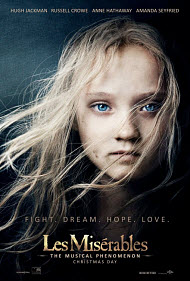

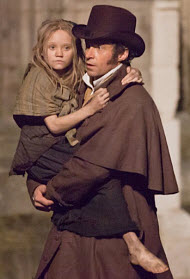

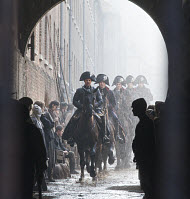



orphans in the Bible
abused child
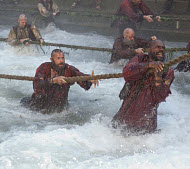
hunger / starvation
mourning
redemption
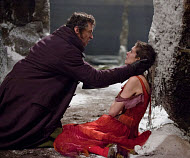
falling in love
TRUE LOVE—What is true love and how do you know when you have found it? Answer
girl disguised as boy
illegitimate child

wedding / marriage
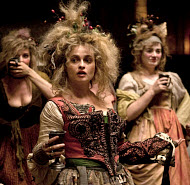
brothel / prostitutes
SUICIDE—What does the Bible say? Answer
If a Christian commits suicide, will they go to Heaven? Answer
ghosts in the Bible
| Featuring |
|---|
|
Hugh Jackman … Jean Valjean Russell Crowe … Javert Anne Hathaway … Fantine Amanda Seyfried … Cosette Sacha Baron Cohen … Thénardier Helena Bonham Carter … Madame Thénardier Eddie Redmayne … Marius Alistair Brammer … Prouvaire See all » |
| Director |
| Tom Hooper—“The King's Speech,” John Adams (TV mini-series) |
| Producer |
|
Working Title Films Cameron Mackintosh Ltd. See all » |
| Distributor |
Alternate version of this story: “Les Misérables” (1998)
Before seeing “Les Miserables,” it is important to understand the background, for a film cannot, and does not, provide much of the underlying roots to Victor Hugo’s classic novel that are necessary to understanding it in a true light. I will therefore ask the reader’s indulgence briefly.
Revisionist historians want to sugar coat the French Revolution while denigrating the puritan roots of our own nation, but the French Revolution failed. It ended in the “Reign of Terror,” anarchy, and the dictatorship of Napoleon. After Napoleon fell at Waterloo, the monarchy returned to France. Victor Hugo’s Les Miserables takes place in this period, and culminates with the failed “July Revolution” of 1830. The reader should also be aware that Victor Hugo was a strong supporter of Napoleon III during the “Second French Republic,” and so many consider that Les Miserables exaggerates the plight of the poor under the old French monarchy. Now, with this mind, let us look at the film.
Somewhere along the line, Broadway musicals decided that great works of literature could be turned into great musicals. “Les Miserables” is one of the most successful of those stage plays. In turning it into a movie, the limited sets of the stage are replaced with the spectacle and grandeur of France in the 1800s. However, it is only the underbelly of France to which we are given a glimpse. Jean Valjean is the central character, who was imprisoned for 19 years for stealing a loaf of bread. He is finally paroled and given a chance at a new life, but finds circumstances make it impossible for him to live, until a priest gives Valjean a chance. Valjean seizes the opportunity to make something of himself, but changes his name to escape the plague and restrictions of his parole. For this crime, he is hunted daily for almost twenty years by Javert, a police officer who considers his duty and honor one and the same, and refuses to look the other way, even when it conflicts with his conscience.
The story, as noted, takes place over a period of many years, and takes its finale from the failed “July Revolution.” I will not give away any spoilers, but the reader should be aware that this is a dark film. It is a film, like Hugo’s other stories, about the triumph of spirit over the darkness of the world, but it is also a film where God appears only in the shadows. Like the failed French Revolution, the world which Hugo depicts, is one in which God is not welcome. The redeeming figures in the film do pray to God, and it is priests and churchmen who often provide relief to Valjean when he needs it, but Javert is also seen praying, and asking for Valjean to be brought to justice. It seems that God is painted gray.
Artistically, the film is beautifully filmed and directed, and the acting is largely superb. I do, however, have problems with Sacha Baron Cohen’s depiction of Thénardier, the con artist and nemesis of Valjean. Anyone familiar with Cohen’s sense of humor knows that he relies on gross out humor and shock. He has taken that flair and invoked it Thénardier. To be sure, Thénardier is supposed to be a con and wretch, but the humor Cohen uses (for which the director can also be blamed) is over the top, and involves some very crude jokes which were not in the stage play, or book. This takes us to the film’s generous PG-13 rating.
We all know that the ratings system in Hollywood is messed up. It is for that very reason that sites like this one have grown. From a Christian perspective, this movie should clearly have been rated R. There are multiple sex scenes, one of which is very crude and played for “humor.” Additionally, there are some disgusting jokes and crude scenes which frankly cannot even be discussed here. One involves animal parts, and another involves human excrement.
Next, there are several scenes where the characters utter cuss works which did not exist in the 1800s. Has Hollywood really become so debased they think that everyone talked like gutter rats of today? The words were not even invented back then. Finally, there is ample violence, particularly at the end of the film, when we literally see a pool of blood. Children are shot by the police, and dead bodies are strewn about. Some of this (particularly the violence) is an essential part of the story and film, but much of it is unnecessary and was not in the classic novel.
Finally, we come to the music, for this is a musical—as anyone familiar with “Les Miserables” knows. The songs are obviously classics. What not everyone may know is that the film is considered “revolutionary” in musical history because it uses a new technique for the actors’ singing. They sing “live.” What does this mean? Simply put, traditional musicals record all the songs in studio and then have the actors lip-sink on set. The criticism of this is that it limits the acting of the stars. If an actor wishes to be melancholy, then he should not be singing as fast as a song might have been recorded.
Now, for the first time, the actors sing “live,” and the studio records the song later, to match their live singing. The result is obviously much better acting, for which the film has received praise, but it may hamper the music. This is, however, something I will leave for the music critics, for I found the songs as good as any sung by actors. Indeed, some were very good at singing.
My conclusion is that “Les Miserables” is a wonderful musical hampered by Hollywood’s excesses. Fans of the novel or musical will love the film, but others may be put off by the long run time and the dark nature of the story. Indeed, as a Christian, I recommend that the film be viewed as a look at the world of those who reject the Lord. It depicts the dark world which men make when God is scorned. Valjean finds a way out of this sewer by finding God. So can we all, through Jesus.
Violence: Heavy / Profanity: Moderate / Sex/Nudity: Heavy
See list of Relevant Issues—questions-and-answers.


I agree that, yes, the cleavage bearing outfits were a bit much, as were the movements women were making at the beginning of the film. Inappropriate and the PG-13 rating is correct. As a Christan I DON’T condone the sexual behaviors, while at the same time I understand it was necessary.
The music was phenomenal! Simply breathtaking. I almost started crying in one scene. I never cry in movies, so that alone says how good the musical performances were. Certain characters caught my attention though: Fantine (Anne Hathaway), Jean Valjean (Hugh Jackman) and the young Cosette. There honestly wasn’t a bad performance from any of the characters.
No profanity that I was aware of (I was probably too impressed with the story to pay attention though). Once the film concluded, many applauded… including me. I hadn’t seen a film this well made since the “Phantom of the Opera” with Gerald Butler. I can honestly say that this will be in my DVD/Blu-ray pile next year. Congrats Universal! After 100 years of filmmaking, you haven’t lost your touch!
Moral rating: Offensive / Moviemaking quality: 5
Moral rating: Better than Average / Moviemaking quality: 5
Moral rating: Good / Moviemaking quality: 5
Moral rating: Average / Moviemaking quality: 5
There are a few sex scenes but nothing to bad, and the sexual comments that are made are few and wide apart. The overall tone of the movie, is dark, but it fearlessly deals with prostitution, suicide, children out of wedlock. Yet it puts all these things in a negative right. Never once does it condone these sins.
In fact, the story holds wonderful morals about standing up for what is right, and finding forgiveness in God the Father. There is cursing in the movie but most of it is lost in the din of battle. This is not a movie for young eyes and ears or for the tender hearted but for those who enjoy action, history, and romance it is a good film. It was beautifully made and the cast did a wonderful job singing. I recommend it whole heartedly.
Moral rating: Average / Moviemaking quality: 4½
This movie is a stunning blend of a reinvention of the stage show and moments directly from Victor Hugo’s 1862 epic. The cinematography is beautiful and the singing is wonderful and real. Tom Hooper doesn’t shy away from the gritty realism of the extreme poor. To provide for her daughter, Fantine sells her hair, her teeth, and her body, becoming a prostitute. Although disturbing, it shows the reality of such a situation. See all »
Moral rating: Good / Moviemaking quality: 4½
For the remainder of his life, Jean Valjean lives to help others—whether it is a man pinned down by a runaway cart, the orphan Cosette, her love interest, Marius (among many others), or even his mortal enemy, Jean Valjean consistently extends to others grace and mercy that he himself has received. Through it all he sacrifices much and goes through a lot of suffering.
In the end, he comes to realize that God had a purpose for everything that he went through. Ultimately, this is the story of a man who discovers God’s purpose for his life, even a life filled with much difficulty and suffering.
Moral rating: Excellent! / Moviemaking quality: 5
If he is to be called anything but a Christian character for his refusal to judge people, for his dedication to ministering to others, to caring for the lowest of the low, and for forgiving his enemies, then I believe you may be reading a different Bible than the or I read. Regarding the character of Javert, I did not see him as some sort of representation of Hollywood’s “take” on Christianity. Javert is nothing if not sincere in his beliefs, and he accurately represents the misguided groups of people who so desperately to find a faith that is based in forgiveness, not in works. He is not some kind of caricature: he is (or should be) a call to action for us all. See all »
Moral rating: Better than Average / Moviemaking quality: 5
Javert, in contrast, is someone who considers himself devout but is nothing but an angry and vengeful man who is lacking in any human kindness or mercy. He is a “pharisee” and lives with the letter of the law but no compassion or true sense of God whatsoever. I have seen this musical on stage twice and the movie is very faithful in it’s portrayal. In terms of sexuality I felt the movie toned it down! I often disagree with your reviews but I am so disappointed and amazed that you did not see the most beautiful expression of the love of god and how Jean Valjean truly lived it! This is one of the best movies I have seen especially in terms of how we should live to show God’s love.
Moral rating: Excellent! / Moviemaking quality: 5
There was a scene cut, because I was viewing it in the Middle East. I will add that there were things that were hinted at, and immodesty throughout. There was not more swearing than there is in the musical—if anything, there was less, because of things they cut or changed. See all »
Moral rating: none / Moviemaking quality: 5
A former criminal is shown mercy by a priest and embraces God. He embarks on a new path, determined to be a good, honest better Christian person. Included in his new mission of love is to adopt the daughter of a dying woman and raise her well. She is good and honest and marries a nice young man. Many cast members in the film look to God, and they famously declare that “to love another person is to see the face of God”. This film is filled with characters who look to God for guidance. It’s a film of compassion, love, mercy.
Yes, there are very difficult scenes, but I am very dismayed that people would give this a negative review. The negative scenes, of poverty, prostitution, death, etc. They are there for a reason! Not to be exploitative. This is a beautiful film about being a good honest Christian, being kind, taking mercy and loving others. It’s not easy to watch, of course, but I enjoyed it. And the music is great, too!
Moral rating: Average / Moviemaking quality: 4
I found the sexual content a part of the life God created. I found the sin and the human faults and flaws accurate in real life. I find nothing wrong with this movie, as a mother, a grandmother and a Christian. I think the actresses were amazing portraying what we go through as women. I think the singing from actors who are not singers was lovely, and the singing of the adult Cozette was like an angel! Her vibrato and pitch, etc. … was perfect, and melodic of a real Angel in Heaven. See all »
Moral rating: Excellent! / Moviemaking quality: 5
Let’s start with the singing. The singing in the film isn’t terrible, but it might bother fans of the stage play, because it doesn’t sound “pretty”. Best examples would be Anne Hathaway’s version of “I Dreamed a Dream,” Hugh Jackman’s “Bring Him Home,” or anything with Russell Crowe. But while the singing may not be as good as it is on the stage, the actors do a great job of bringing new light to the songs, and they really do put passion into it. I know people debate that Crowe’s acting and singing was weak, but it personally didn’t bother me. I was able to watch his performance and enjoy the movie. See all »
Moral rating: Excellent! / Moviemaking quality: 4½
What so many Christians try to do is avoid sinners and the world at large, when our Lord expressly went out of his way to spend time with and around them! Association does not always imply consent! In that same vein, this movie does contain a few (I repeat, a few), instances of bawdiness and unseemly behavior. I enjoyed the movie immensely, but honestly was a bit put-off by the Innkeeper scene. I barely heard the Lord’s name being used, because I was waiting for that scene to be over and looking at my popcorn.See all »
Moral rating: Better than Average / Moviemaking quality: 4½
I get really tired of pharisaical denunciations of artistic works because they contain depictions of nudity, sin, or some “cussing.” The Holy Bible itself depicts all these sins and more and is not a child-friendly book. That is why Christian booksellers sell very many editions of highly edited Children’s” Bibles. See all »
Moral rating: Excellent! / Moviemaking quality: 5
Absolutely, this is not a film for young children. However, the degradation of this movie is the point. Through the bad choices of fallen people, we see how lives are affected. Then, in the midst of those horrible moments, those dark and ugly places, God shows up and is still willing to love and redeem His people. The audience should take away how simple decisions that seemed small pushed the characters into hopeless seeming situations. Then we get to watch God work through them when they lean on Him.
In the Bible, some of the mightiest people are those that were shunned by regular society. I believe it is easiest for God to use the broken. As for this movie, I cried through the ending, just like I did in London 26 years ago.
Moral rating: none / Moviemaking quality: 4½
I was so glad for the Christian incidence, especially in the songs. But I just can’t understand why people would make scenes that kids shouldn’t watch. What a waste of such a powerful message, there is a way to impact, without offending.
Moral rating: Very Offensive / Moviemaking quality: 5
Moral rating: Average / Moviemaking quality: 4
However, what ended up bothering me the most (after the offensiveness of the sexual scenes and the use of Jesus” name in vain in one of the songs) was the ending. As Jean Valjean dies and walks away from his mortal body, presumably to heaven, he is greeted by all the departed of revolutionaries, etc. In a sweeping rendition on the set of the final song (“When Tomorrow comes”), and I suddenly thought “really, really, is this meant to portray that all these people are with the Lord (?), none of whom were portrayed as even remotely redeemed throughout the film!” Somehow, that final scene said that we are all “okay” as long as we try to “do good” here, or are so poor we have had no chance. See all »
Moral rating: Offensive / Moviemaking quality: 4½
There are some things I did love about it—Anne Hathaway was absolutely wonderful; how they introduced “Did You Hear the People Sing” was a stroke of genius, and if the entire film had been as brilliantly done as “One Day More,” it would have been a masterpiece. Regarding the inappropriate content, I thought how Fantine’s scene was handled was very tactfully done, but the scene at the inn between the prostitute and “Saint Nick” was totally tasteless. I may rent it at some point for a re-watch; my opinion could change, but all in all, I wasn’t impressed. My favorite version of the story remains the 1998 version.
Moral rating: Very Offensive / Moviemaking quality: 3½
It must be understood that the story is inevitably gritty, though I do believe the portrayal of the debauchery at the inn was over the top. It is meant to show the underbelly of France’s poor as the reviewer says, and these characters are portrayed as cons and enemies, not as good. However, I do not want those images and sounds in my head, and sadly to say, they immediately come to mind when I think back on the movie. This is upsetting to me because I enjoyed the movie so much and would love to watch it again, but it is not at all family-friendly. I would not want my 16 year-old sister watching the film, though she could easily watch an earlier non-musical version of it.
If I could recommend a plan of action for Christian movie-goers, it would be to rent the movie when it comes out and fast-forward the inn scene as well as possibly the scene where Fontine prostitutes herself. Just don’t fast forward her next song in desperation after she gives herself up, as it is a highlight of the movie!
Moral rating: Offensive / Moviemaking quality: 4½
Moral rating: Average / Moviemaking quality: 4½
-slavery and authority, despotism, evil, suffering… and law but not humanity important
-victim man steal in the church the treasure which doesn’t belong there but good priest help him and save him from the law, but what was the church position with state See all »
Moral rating: Good / Moviemaking quality: 3
Hugo was a Catholic, but, like many believers, left the faith, perhaps overwhelmed with the political upheaval of the time and personnel loss, several or all of his children died tragic deaths. The time period is after the “enlightenment” had ushered in the French Revolution. This socialist peoples revolution was an anti-God revolution, and, like all atheistic revolutions, the Church and clerics were its target, layity and cleric murdered, persecuted and the Church weakened. The socialist peoples government could not fill the spiritual and physical needs of the masses and the ensuing poverty, darkness, and hopelessness is amply portrayed. Napoleon allowed religion, but I think controlled as he saw it provided morality and hope. See all »
Moral rating: Very Offensive / Moviemaking quality: 3½
As a Christian, I can not recommend this movie. If you want to be moved, listen to the sound track—truly beautiful music. I was very disappointed by the sexual content. I never, ever watch a movie with this level of sexual content, and I kick myself for not investigating further before watching it. Hope this review helps other believers, in their decision on whether to go or not.
Moral rating: Offensive / Moviemaking quality: 5
Moral rating: Offensive / Moviemaking quality: 4
Moral rating: Very Offensive / Moviemaking quality: 4½
Moral rating: Extremely Offensive / Moviemaking quality: 1
Moral rating: Extremely Offensive / Moviemaking quality: 5
Moral rating: Extremely Offensive / Moviemaking quality: 3
Moral rating: Very Offensive / Moviemaking quality: 5
“Les Miserables” the movie makes a hash of the show and its meaning. While they pulled out all the stops to make the movie look good, they made a primary error: in nearly all cases music where characters sing is prerecorded (Rex Harrison in “My Fair Lady” was an exception). Actors who are not primarily singers record the songs again and again, and the times they wobbled onto the right tune are spliced together. This has never affected the performances of most actors in musicals. Here, actors, rather than professional singers, sing “live” and the filmmakers, therefore, let the actors guide that beautiful music.
Therefore, the wonderful tunes that made “Les Miserables” a success in the first place are given to us not by musical experts but in the momentary subjectivity of actors.
The movie also has unnecessarily disgusting shots. But most troubling to me are slight changes in the lyrics that turn meanings upside down, including in the beautiful finale, which never failed to move me when presented on the stage.
The final image is repellent to a Christian mind. It appears Hollywood can’t be trusted with anything that has a whiff of Christianity about it, even when it’s handed to them on a platter.
Moral rating: Very Offensive / Moviemaking quality: 4½
In my belief, this film has a wonderful message. While the film is dark, it has an eventual end that leaves you with a strong ray of hope, along with the certainty that what God brings tomorrow will be for the better. And in God’s portrayal in this film, it’s better than what you are going to find in many other films in Hollywood. Our heroes pray and treat him reverently. Many songs reference to the fact that he is there and cares about his people.See all »
Moral rating: Excellent! / Moviemaking quality: 4½
Some may say it has Socialistic themes like the unfairness in class. There are indeed several Left wing messages throughout, but me, being a Right winger, I thought, “Wasn’t our revolution partly inspired by the unfairness of the monarchy, as well, that the kings and lords make themselves out like gods?” That was one of the main reasons of Hugo being against the monarchy. There are politics in which I disagree with, but, as a whole, it is a book of faith, and that is what I love. See all »
Moral rating: Offensive / Moviemaking quality: 4
Also, I know it was a musical, but don’t musicals have speech, too? Though the singing was superb, the whole thing was singing. I have seen other musicals, film and stage productions, and it’s not just singing all the way through, there is speech, too.
Overall, this film was amazing, and it brought me to tears at some parts. I’m not sure that I would watch it again, mainly because of its length, but it is a very good film, and I would recommend it, though not to younger audiences.
Moral rating: Good / Moviemaking quality: 5
The instances in which the crude underside of 19th-century society are shown exist in order to vividly exhibit the trials and tribulations that many of the characters face, and therefore expound the importance of faith without seeking reward. See all »
Moral rating: Excellent! / Moviemaking quality: 5
My mother first exposed me to this musical when I was three years old, and I have been fond of it my whole life. I think that artistically it is a film with great merit, but I think Christians will especially enjoy this wonderful story. Personally, my only problem with it was Russell Crowes portrayal of the character, Javert. His singing was just a mile behind every other cast member, and it really seemed as though he failed to grasp the essence of the character he was playing.
Moral rating: Excellent! / Moviemaking quality: 5
I had no idea how dark and gritty this movie was. No idea! The beginning was fine, just fine. So I relaxed, as it began with Jackman’s character. Then the ugliness began. I am sick that I took my sweet, pure daughter to this. We got up and left after the crude Santa scene. I kept telling my daughter to close her eyes… not enjoyable. I thought somehow, this movie was going to turn around. She was embarrassed during the Santa scene, as I was not expecting that, so we both saw it! Now that memory is with her, and I have huge regrets. I feel absolutely sick. This is the last time I take someone’s opinion, without checking with this Web site first.
I can find love and forgiveness through Bible stories, and what God has done in my life and other’s. I need not sit through a crude film such as this. A family with 2 young girls was sitting next to us when we arrived, so I felt like I was in good company. I pray that they left as well! Maybe the musical play is much better, and that is where “Les Miserables” gets such notoriety. I don’t want to take the chance again!
First off, let me mention, if I may, that I enjoy musicals. “The Sound Of Music,” “Fiddler On The Roof,” “Singin” In The Rain,” “My Fair Lady,” “Mary Poppins” and “Chitty Chitty Bang Bang” are some of the musicals I’ve seen over the course of my short life on Earth. So why don’t I want to see “Les Miserables,” simply because it’s based on a musical? Even when it’s got several excellent actors in the crucial roles? See all »
PLEASE share your observations and insights to be posted here.

MORALLY: THE GOOD: The story is primarily a tale of redemption, and the main character Valjean’s journey from prison and hating, to salvation, and learning to be selfless, merciful and loving. There is also a contrast between Valjean’s story of grace and Javert’s more legalistic worldview, and how grace wins and legalism destroys. The message of the cross is quite strong for a Hollywood film, and is not diluted from the stage show. There is also the tale of students fighting in a battle for what they believe in, even though the odds may not be in their favour.
THE BAD: The Thenardiers” song “Master of the House” uses the name of Jesus in vain a few times (they are supposed to be the comic relief, they will offend, but they are not portrayed as the “good guys”). There are also sexual references and a scene about prostitution (not justifying it, but it is a character doing it out of desperation to try to save her child; it is not glamourized or encouraged). Many characters die (one is a suicide and a sound effect made our audience gasp), but, other than that, I didn’t find it overly graphic (I am usually sensitive to this). I am not trying to justify the morally objectionable parts. Don’t watch it if that bothers you, and that is why I strongly caution you to not take children.
But the story of redemption is absolutely beautiful and unmistakable. I’ve seldom seen a movie so powerful.
My Ratings: Moral rating: Better than Average / Moviemaking quality: 5